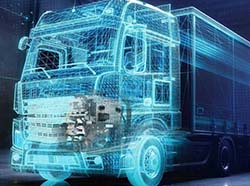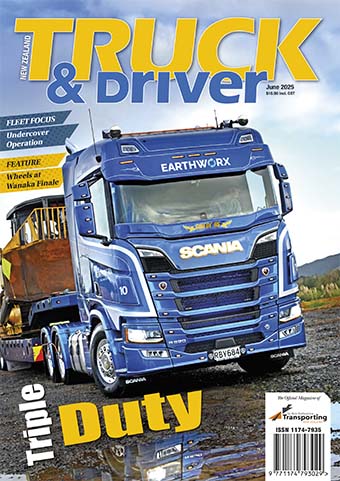
Toyota Gases up Hydrogen for HVs
Posted: 27-Feb-2025 |
In a major step forward for sustainable commercial transportation, Toyota has unveiled its new third-generation hydrogen fuel cell (FC) system, which is tailored to meet the demands of the heavy commercial vehicle and machinery sectors. The innovative technology was showcased during the International Hydrogen and Fuel Cell Expo held in Tokyo.
Toyota claims this third-generation FC system offers groundbreaking improvements in durability and efficiency while also reducing costs significantly. According to the company, the system is designed to be maintenance-free and boasts a durability level that is comparable to conventional diesel engines, achieving twice the lifespan of the previous generation. Fuel efficiency has also increased by 20 percent, translating to a 1.2 times improvement in fuel economy, which enables greater range. These advancements were made possible through innovations in cell design and manufacturing processes, which have also helped drive down production costs, making the system more accessible than before.
The upgraded FC system underscores Toyota's vision of hydrogen as a cornerstone fuel in its pursuit of carbon neutrality. The company has made significant investments in hydrogen technology, with development efforts focusing on transportation, storage, and broader hydrogen use cases. Notably, Toyota emphasised that the "continuous evolution of FC technology" is necessary to accelerate adoption and realize the hydrogen society it envisions. This new system marks a "significant step-change" in fueling that transformation .
Toyota plans to begin the commercial production of the new fuel cell system in 2026, targeting heavy-duty commercial vehicle markets in Europe, North America, Japan, and China. The company has a rich history of advancing fuel cell technology, beginning with the commercial launch of its first FC system in the Mirai fuel cell electric vehicle (FCEV) in 2014. Since then, Toyota has sold approximately 28,000 Mirai units across more than 30 countries. In 2019, the company diversified its applications of fuel cells by supplying them for buses, trains, and stationary power generators. To date, Toyota has delivered over 2,700 fuel cell systems to more than 100 customers worldwide.
In addition to targeting these core markets, Toyota is expanding its hydrogen ecosystem through collaborations with other industries and manufacturers. Partnerships with key players like U.S.-based truck manufacturer Paccar demonstrate Toyota’s commitment to advancing hydrogen technology in the heavy vehicle sector.
As Toyota continues to push the boundaries of fuel cell innovation, its leadership in hydrogen technology is paving the way for a cleaner future. With this third-generation system poised to deliver scalability, cost-effectiveness, and performance on par with traditional diesel engines, the company is well-positioned to accelerate the global transition toward sustainable transportation solutions.



 + EQUIPMENT GUIDE - FREE
+ EQUIPMENT GUIDE - FREE
